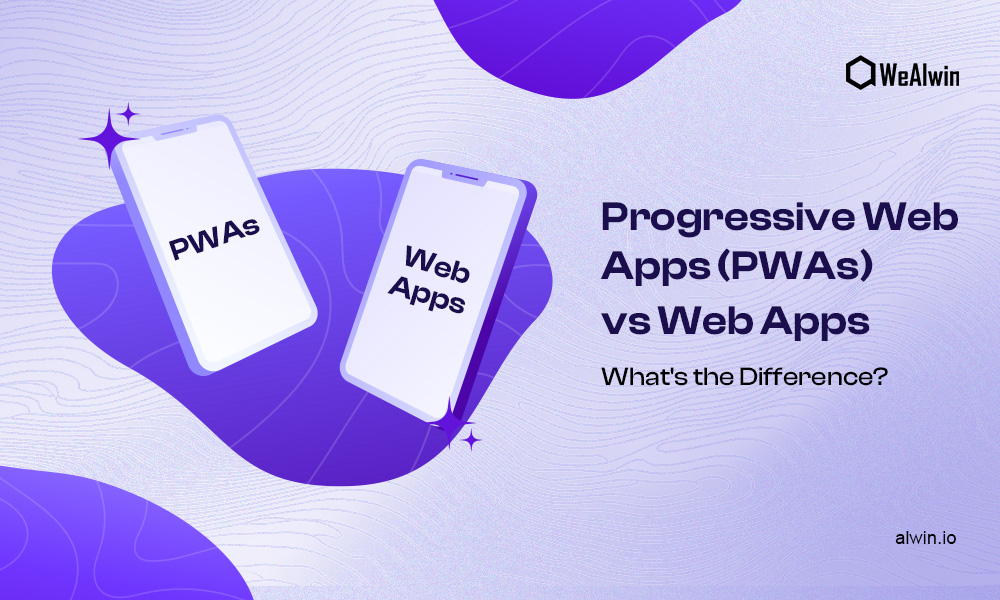In the world of web development, the terms "Progressive Web Apps (PWA)" and "Web Apps" are thrown around quite often. But what exactly are they, and how do they differ? Let's dive right into it.
Progressive Web Apps (PWA) and Web Apps
To put it simply, a web app is an application that is accessed via a web browser over a network. That means it's not something you'd download from an app store but something you’d access through your web browser.
On the other hand, Progressive Web Apps (PWA) is an upgraded version of conventional web apps with added functionalities. They offer a smooth, app-like user experience and can work offline, send push notifications, and even be installed on a device, much like a native app.
Importance of Understanding the Distinction between PWA and Web Apps
Understanding the distinction between PWA and traditional web apps is crucial for businesses and developers alike. It allows you to make informed decisions about the technologies you use to build engaging, user-friendly digital experiences.
Whether it’s boosting user engagement, improving loading times, or offering offline functionality, the choice between a PWA and a traditional web app can have significant implications. We'll delve into these differences and benefits in the sections to follow.
Progressive Web Apps (PWA)
Characteristics of PWA
Progressive Web Apps, popularly known as PWAs, represent a new generation of web apps that provide an enjoyable, interactive, and efficient user experience.
They blur the lines between native apps and websites, offering the functionality of the former and the accessibility of the latter. PWAs are recognized by key attributes like responsiveness, connectivity independence (operates offline), and app-like navigation which make PWAs an excellent choice for businesses and individuals seeking a reliable, fast, and engaging web experience.
Features and functionalities of PWA
PWAs come packed with numerous compelling features. They're designed to be:
• Responsive: Adjust to any form factor, desktop, mobile, tablet, or forms yet to emerge.
• Connectivity independent: PWAs should work in areas of low connectivity or offline.
• App-like: PWAs use the app-shell model to provide app-like navigations and interactions.
• Secure: Transmitted via HTTPS to prevent prying and data tampering.
Benefits of PWA for users and developers
The growth and acceptance of PWA are mainly due to the numerous benefits they offer. For users, PWAs contribute to a seamless, efficient user experience irrespective of the network state. They also allow users to "install" the web apps on their home screens without going through an app store.
For developers, PWA development is a game-changer — it streamlines the development process, saves resources, and reduces time-to-market. With a single codebase for all platforms, developers can focus more on enhancing the app's functionality and user experience rather than maintaining different versions for various platforms.
Web Apps
Web apps represent a vital part of the digital world, serving as gateways to a myriad of tasks you can carry out online. Essentially, these are software applications designed to run on a web server but accessible through the internet browser.
Characteristics of web apps
Web apps are browser-based applications that utilize web technology and web browsers to perform tasks over the internet. They differ considerably from conventional desktop apps as they don't need to be installed on a user's device – they operate directly from a server.
The most prominent characteristics of web apps include compatibility across multiple platforms (for instance, Windows, macOS, Android, iOS), responsive design, and minimal device memory requirement.
Features and functionalities of web apps
Web apps are endowed with a handful of features and functionalities:
• Capable of offering interactive user experiences
• Can support real-time updates and notifications
• Seamless integration with other web services like databases and payment systems
• Can be accessed from any device with a net connection
Benefits of web apps for users and developers
For users, web apps provide anytime, anywhere access to their favorite services. They don't need to fret about device storage or periodic updates. Whether you are using your friend's device or your own, you're just a web address away from your app.
For developers, web apps curtail the perennial issues of software device compatibility and sophisticated update cycles. Without the requirement of users downloading the app, developers are no longer constrained by device-specific coding.
Forsaking the updates on the user's end, developers can propel new features and fixes directly through the server.
Differences between PWA and Web Apps
Understanding the distinction between traditional web apps and progressive web apps (PWA) can be a transformative factor in your decision-making when it comes to application development.
Technology and Architecture Differences
Traditional web apps are known for their reliance on the server to render pages, meaning every interaction with the app requires an internet connection, making server response time a crucial aspect of their functionality.
On the other hand, PWAs leverage the capabilities of service workers, and the cache API to create faster, smoother experiences, independent of network conditions.
User Experience Differences
User experience significantly differs between the two. For instance:
Web Apps: They have been limited when it comes to native-like functionality. For instance, you can't send push notifications or operate offline. They are largely browser-dependent and their functionality and features are restricted by the capabilities of the browser in use.
PWA: They provide an app-like user experience that is more immersive and engaging, irrespective of the device or the browser used. PWAs can be installed on the device like a native application and can send push notifications.
Performance and Speed Differences
PWAs are known for their speed and reliability. PWAs can leverage local caches to store and retrieve data effectively, enhancing their overall speed and performance. On the other hand, traditional web apps’ loading times and speeds depend largely on the speed of the user's internet connection.
Offline Functionality Differences
Perhaps one of the biggest differences lies in the ability to operate offline. While web apps are entirely dependent on an internet connection, PWAs come with offline functionality, allowing users to browse previously loaded data even in the absence or unreliability of an internet connection. The robustness of PWAs sets them apart from traditional web apps by a considerable margin.
Benefits of Progressive Web Apps (PWA)
The beauty of Progressive Web Apps (PWA) lies in their ability to deliver user benefits akin to native apps while still maintaining the wide-ranging accessibility of websites. Here are a few key perks they bring to the table:
Improved User Retention and Engagement
Firstly, PWAs are big on improving user retention and engagement. Imagine being able to interact with your users in real time, even when they are not on your website. That's the power PWAs yield! With features like push notifications and background sync, users are constantly engaged and up-to-date. Furthermore, PWAs can operate offline, meaning users can always access your content — no more 'No Internet connection' nightmares!
Native-app-like Experience on Multiple Devices and Platforms
Secondly, PWAs offer a native-app-like experience across multiple devices and platforms. Despite being web apps, they can be installed on the user's device like a native app, and they run seamlessly on both desktop and mobile platforms.
This adaptability means that no matter what device a user is on, they’ll have a consistent, high-quality experience. Users also spend more time on PWAs as they run faster and are more responsive, leading to overall increased user satisfaction.
Increased Discoverability and Reach
Lastly, the increased discoverability and reach offered by PWAs cannot be overlooked. As they are hosted on the web, they can be easily found using search engines, unlike native apps that are restricted to app stores.
This boosts your visibility, potentially creating a much wider user base. Also, as the barrier to use is either low or non-existent (no need to download or install anything from an app store), the potential for user growth is significant. Essentially, PWAs can help you reach more people, more effectively.
Benefits of Web Apps
Web applications offer a range of advantages that cannot be ignored. Here, we delve into a few of their eminent benefits.
Easier Development and Maintenance
Primary among these benefits is the simplicity of development and maintenance. Unlike traditional desktop applications, web apps don't require you to develop different versions for different operating systems.
Just one version works seamlessly across all platforms — Windows, MacOS, Linux, you name it! More so, updates roll out automatically for all users, eliminating the need for time-consuming manual updates. Simplifying software management for both developers and users is a major advantage that can't be ignored.
• Single version for all platforms
• Automatic updates for all users
Platform Independence and Accessibility
Another significant benefit of web apps is their platform independence. Web apps are accessible from any device that has a browser and an internet connection.
Users can access the same app and data from their office computer, their laptop at home, or their smartphones on the go. This adds an incredible level of convenience and flexibility for users.
• Accessible on any device with a browser
• Flexibility and convenience for users
Lower Development and Deployment Costs
Finally, web apps are typically cheaper to develop and deploy compared to traditional applications. They eliminate the need for complex coding languages or platform-specific knowledge.
Because they're hosted on the internet, there's no need for extensive hardware installations, reducing both upfront costs and long-term maintenance expenses.
• Lower costs for development
• Reduced hardware installations, hence less maintenance costs
Case Studies and Examples
Now let's go beyond just understanding the theoretical differences. It's time to peek into the real-world examples, to truly comprehend the effectiveness of both Progressive Web Apps and traditional web apps.
Real-world examples of successful PWAs
For instance, let's talk about Twitter Lite. As a PWA, it only takes up a tiny fraction of the space a traditional app would on your device (it's just 600KB!). Plus, it's much faster and still offers almost all the functionalities of the native Twitter app.
Another example is Starbucks' PWA. Their PWA version of the site allows users to browse the menu, customize orders, and add them to their cart even offline. Once back online, they could continue placing the order.
Real-world examples of successful web apps
On the flip side, we have companies like Zillow, a real estate giant, that found huge success with their traditional web app. It delivers comprehensive and up-to-date snapshots of houses for sale.
Similarly, Google Docs is another amazing web app that has gained massive popularity, thanks to its simplicity, practicality, and extensive feature offering.
These examples illustrate how both PWA and traditional web apps can massively contribute to a company's interactive and engagement strategies.
How WeAlwin PWA Development Service Meet Your Business Requirements?
Our team at WeAlwin Technologies provides a comprehensive PWA development service that is tailored to your specific business needs. We prioritize:
- User experience: With an emphasis on smooth, app-like interactions.
- Offline functionality: Ensuring your app works regardless of network conditions.
- Speed: To minimize load times and keep your users engaged.
We take your business to the next level with PWA development crafted to your exact requirements. With WeAlwin, you know you're getting an app that not only distinguishes itself from traditional Web Apps but takes the user experience to new heights. Enjoy the advantages of PWA with WeAlwin Technologies!
In the ever-changing digital landscape, it's important to understand the distinctions and the benefits of both Progressive Web Apps (PWA) and traditional Web Apps.
Both have their strengths and applications, but PWAs are rapidly gaining momentum due to their responsiveness, connectivity independence, and app-like interface.



